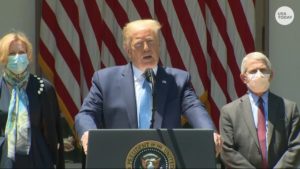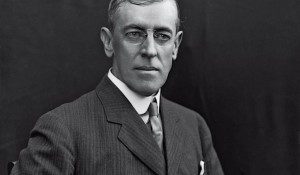What Happens When the President Gets Sick?
The recent news of positive COVID-19 tests for a valet for President Trump and an aide to Vice President Pence revive a thorny question: What happens if the president gets sick? As shown by the corona-related illness of British Prime Minister Boris Johnson, the virus can incapacitate those in high office. What happens if we have an intubated president on a ventilator?

President Trump refuses to wear protective mask even when his aides wear them.
Under the Constitution’s Twenty-fifth Amendment, the president may certify in writing that he cannot perform his office, allowing the Vice President to assume his powers and duties as “Acting President” (not, it bears noting, as president). President George W. Bush did this twice before routine colonoscopies; each time, his certification expired after a couple of hours.
Without a presidential declaration, the president’s disability can be declared by the vice president and a majority of “the principal officers of the executive department” – an undefined term that likely means Cabinet officers. The vice president becomes Acting President unless the president responds in writing that he is able. If the vice president and a majority of top executive officers still deny the president’s ability to do his job, they must convince two-thirds of Congress that they are correct. Unless Congress agrees, the president resumes his powers.
This process aims to avoid drift and indecision during presidential incapacity, though a disagreement between the president and top advisers would create massive uncertainty. The question is not academic. Presidential incapacity has occurred several times, and foreseeably will again. In no instance has any stricken president taken steps to delegate his authority.
In the republic’s first eighteen months, President George Washington suffered from two grave illnesses that doctors expected to kill him. Through the critical phases of each, and through many weeks of recuperation thereafter, Washington took no step to cede any power to his vice president, John Adams.
Over the next sixty years, Presidents William Henry Harrison and Zachary Taylor contracted fatal illnesses in office. Since each expired in less than ten days, however, healthy successors took office before serious drift could set in. Other presidents who died soon after becoming disabled include three who were shot by assailants (Abraham Lincoln, William McKinley, and John F. Kennedy), and one who suffered a fatal heart attack (Warren Harding).
More problematic, though, were the three weeks in late 1863 when Lincoln staggered from apparent smallpox, or the ten weeks in 1881 when James Garfield slowly died from an assassin’s bullet. Following a 1955 heart attack, Dwight Eisenhower was largely incapacitated during six weeks in the hospital.
Woodrow Wilson provides the most striking example of lingering presidential disability (which I wrote about in my soon-to-be-reiussued novel, The Paris Deception). During the Paris Peace Conference after World War I, Wilson endured a bout of the Spanish flu, then suffered an apparent stroke. A few months after rallying from those afflictions, a massive stroke left Wilson bedridden for the last seventeen months of his presidency.

President Woodrow Wilson, the poster child for presidential incapacity in office.
During those long months, the weak and suffering Wilson clung tenaciously to his office, seeing almost no one. His vice president, Thomas Marshall, chaired Cabinet meetings and his staff submitted issues to Wilson’s sickroom for decision. Wilson returned most decisions through his wife, Edith, which has led some to proclaim her the nation’s first woman president.
Given the acceleration of political and economic events since 1790, prolonged presidential incapacity has become far more dangerous. Yet, with the exception of George W. Bush and his colonoscopies, no president has voluntarily relinquished the powers of the office that he labored so hard to acquire.
Indeed, the qualities that drive a person to seek high office will not always include a willingness to walk away from power. Certainly nothing in President Trump’s career suggests that he possesses that quality. A prolonged presidential illness today seems likely to include a high risk of government paralysis and uncertainty that would test the Twenty-Fifth Amendment, and the government, as never before.
Thank you, Dave. I am happy to have this info and clarification.
Very interesting question. Wilson should automatically rank below Harding, Buchanan and A. Johnson for his deceit., some might say incompetence. It should be unforgivable but it is quite forgettable for most.
I know the guys smarter than me really love Woodrow, but he he beats the second Johnson in term of getting American boys killed. He should stack below those four, at least.
You’re not alone in thinking ill of Woodrow Wilson these days, but there are criteria by which he does tolerably well, including pressing for reforms (Clayton Antitrust Act, Federal Trade Commission, Federal Reserve Commission), and ultimately supporting women’s right to vote. His vision of a world organization that would resolve disputes peacefully has never been realized, but changed how people think. I would view his presidency as a mixed bag.
Wilson was a outspoken racist. As president of Princeton, he refused to admit Black students including Paul Robeson who instead went to Rutgers where he was an All-American athlete and valedictorian of his graduating class.